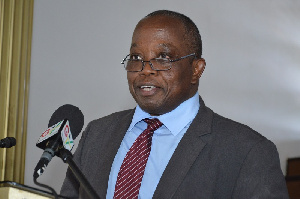Over 2,700 Ghanaians sign petition demanding Domelevo’s recall

About 2,700 individuals have signed a petition calling on President Akufo-Addo to reconsider his directive for the Auditor-General, Daniel Domelevo to take his accumulated leave.
These calls follow similar moves by other civil society organisations demanding the A-G’s return from his 167 leave days.
According to the Presidency, the A-G has only taken nine working days of his accumulated annual leave since his appointment in December 2016.
Daniel Domelevo was to hand over all matters relating to his office to the Deputy Auditor-General, Johnson Akuamoah Asiedu until his return from his “well-deserved leave.”
But Mr Domelevo believes the decision was made in bad faith because his work is embarrassing the government.
The subsequent correspondence between the A-G and the Presidency has raised concerns among the public about implications for the anti-corruption fight.
The petitioners argued that the leave directive is “an unconstitutional and flagrant interference with the independence and mandate of the Office of Auditor-General” adding that it derails the gains made by the office in the fight against corruption in the country.
With over 2,700 signatories, the petitioners also wondered the “perception the Government expects the public to have of a decision now to send the Auditor-General on 167 days’ leave, preventing him from plugging leakages in public finances, while at the same time claiming to uphold that Auditor-General office’s important constitutional role of protecting the public purse to identify such leakages in the first place.”
“Mr President, this directive risks eroding the public’s faith in your commitment to fight corruption and destroying the goodwill your administration has enjoyed from Ghanaians throughout your tenure in office” they argued.
The petition, which was submitted to the Presidency July 8 encouraged President Akufo-Addo to rescind the decision.
“We urge you to consider our letter, review your decision, and revoke the directive to the Auditor General forthwith. We urge you to do so without requiring this matter to be challenged in Court, which would simply lead to increased concern and uncertainty over this matter and over the status of the office of Auditor-General.”
Read the full petition below.
July 2020
Dear Mr President,
Concerned Persons Respond to Presidency Concerning Auditor-General
We, the undersigned, hereby wish to register our deepest concern over the recent steps taken by the Presidency in relation to the Auditor-General of Ghana.
The decision to require the Auditor-General to take enforced leave of office based on his accumulated holiday entitlement is – with the greatest respect to the Presidency – an unconstitutional and flagrant interference with the independence and mandate of the Office of Auditor-General.
We call on the Presidency to reconsider this decision as a matter of urgency, and allow the Auditor-General to proceed unimpeded in his important work.
The Auditor General’s Independence is Guaranteed by the Constitution
Article 187 (7) (a) of the Constitution states:
In the performance of his functions under this Constitution or any other law the Auditor-General – (a) shall not be subject to the direction or control of any other person or authority; [Emphasis added]
This provision is clear and unambiguous. The framers of our Constitution limited the President’s powers over the Auditor General to the power to “acting in accordance with the advice of the Council of State, reques(ting) the Auditor-General in the public interest, to audit, at any particular time, the accounts of any (public) body or organisation as is referred to in clause (2) of this article(187).[1]” [Emphasis added].
Furthermore, the Constitution prescribes that the “The salary and allowances payable to the Auditor-General, his rights in respect of leave of absence, retiring award or retiring age shall not be varied to his disadvantage during his tenure of office”[2]. This is the only provision in the Constitution that deals with the Auditor General’s leave entitlement. The framers of our Constitution correctly described the Auditor General’s entitlement to leave as a “right”, and as such he is free to exercise that right, or allowed to forfeit it.
Commenting on the independence of the Auditor General in Appiah-Ofori vs Attorney General[3], Justice Dotse (in a minority opinion) said:
It should be noted that in view of the very important watchdog role that the Auditor-General plays or is supposed to superintend in the transparent use and accountability of the public purse, any attempt to prejudice and or compromise his position by linking it to the pleasure of a sitting President is untenable. This is because the President is the head of the Executive Branch of Government whose use of monies [sic] entrusted to them the Auditor-General is constitutionally mandated to Audit.
The practical effect of the Presidency’s directive is to subject the Auditor-General’s ability to perform his important role to an executive decision on when he might or might not take his annual leave.
The framers of the Constitution cannot have envisaged that the Auditor-General could be directed to take his annual leave against his wishes, thereby rendering him entirely incapable of performing his role. With respect to the Presidency, a decision to require him to do so is unconstitutional.
The Constitution takes precedence over the Labour Act
We have seen some of the communications between the Auditor-General and the Presidency, and media statements about this matter, commencing with a statement issued by the President’s Director of Communications dated 29 June 2020. By this statement, the Presidency announced that the Auditor-General had been “directed” to “take his annual leave”, with the grounds relied on for this direction being said to be Section 20(1) and 31 of the Labour Act 2003.
The Labour Act is, of course, inferior to the Constitution, which is the supreme applicable law in Ghana. Viewed another way, Acts of Parliament must of course be read so as to ensure consistency with the Constitution. Accordingly, even if the Labour Act contains any provision which might be interpreted as giving the Presidency the power to direct public officers to take leave, such a provision would have to be read in a manner consistent with the Constitution’s provisions concerning the Auditor-General. Where there is any conflict, the Constitution’s provisions must prevail.
The above said, there is simply no genuine conflict between the Labour Act and the Constitution here. Sections 20(1) and 31 of the Labour Act do not in fact give any power to the President to mandatorily require the Auditor-General to take leave. Section 20(1) sets out that a worker is entitled to not less than 15 days leave per year. That provision does not provide any power to compel a worker to take leave. Section 31 deals with agreements (i.e. between employer and employee) for the worker to relinquish or forgo their entitlement to leave. For example, if an employer requires an employee to sign an agreement to give up their legal entitlement to holiday, the Labour Act quite rightly voids such an agreement. Those who drafted the Labour Act were concerned to protect workers from unfair labour practices of employees who might require them to work against their wishes and forgo their entitlement to leave.
We have also seen a letter of 3 July 2020 from the Presidency to the Auditor-General which refers to the case of Samuel M. K. Adrah v Electricity Company of Ghana (22 February 2018). This case is relied upon for the proposition that Section 31 of the Labour Act is to be interpreted as stating that “annual leave is mandatory” and that this is to prevent workers from converting “annual leave to cash to the detriment of [the worker’s] health and well-being.”
That case sheds no light on the position of the Auditor-General. The case was about a worker with the Electricity Company of Ghana, who is an employee of a state-owned enterprise. Unlike the Auditor-General, the worker concerned was not in the position of a public servant whose independence is guaranteed by any provision akin to Art. 187(7) of the Constitution.
Respectfully, nothing in the Labour Act 2003 or any authority of which we are aware, gives the President the power to compel the Auditor-General to proceed on leave against his wishes, irrespective of whether or not the Auditor-General is in need of an opportunity to “rest and be refreshed”.
Why require the Auditor-General to take leave of 167 days?
We wish to point out that since the alleged “mandatory” annual leave entitlement of a worker under the Labour Act is 15 days per annum, it is curious that the Presidency has nevertheless ordered the Auditor-General to take his full accumulated leave entitlement under his terms and conditions of employment (which has been variously stated as 123 or 167 days). We question why, if there is genuine concern for the wellbeing of the Auditor-General, and a genuine concern to conform with the Labour Act, that the request for him to take leave has not been limited to the statutory minimum of 15 days per annum.
As important as the health and wellbeing of the Auditor-General is, as a matter of competing public policies, it is more important for Ghana that he chooses to do his work how and when he wishes to do so, than for him to be directed by the Presidency to take an inordinately lengthy period of leave so that he may have the opportunity to “rest and be refreshed”.
Finally, we wish to point out the sad irony of the situation that an Auditor-General is compelled to take up to 167 (working) days leave on the basis that he needs an opportunity to “rest and be refreshed”, at a time when he is a little over 200 days from retirement from the Audit Service. We question how the public is expected to consider such a decision as made in good faith, in circumstances where the Auditor-General is essentially being asked to make himself well “rested and refreshed” for the commencement of his retirement. Mr. Domelevo’s absence during this 167 day period would mean he will not be able to actively execute his Constitutionally-prescribed role as protector of the public purse during the crucial 6 month period before the general election, a period which has historically been characterised by increased risks of misuse of public funds.
The public is ready once again to measure government’s commitment to fighting corruption
The government’s commitment to waging an unrelenting fight against corruption was one of the key reasons many Ghanaians reposed their trust in the current government. Indeed, one of the NPP’s campaign promises was to “plug leakages in the administration of public finances”[4]. The NPP cited “The Auditor General’s Report (which) has indicated that between 2012 and 2014, GH¢5.9 billion of government funds cannot be accounted for,”[5] as evidence of the leakages in public finances.
We ask what perception the Government expects the public to have of a decision now to send the Auditor-General on 167 days’ leave, preventing him from plugging leakages in public finances, while at the same time claiming to uphold that Auditor-General office’s important constitutional role of protecting the public purse to identify such leakages in the first place.
Mr President, this directive risks eroding the public’s faith in your commitment to fight corruption and destroying the goodwill your administration has enjoyed from Ghanaians throughout your tenure in office.
We urge you to consider our letter, review your decision, and revoke the directive to the Auditor General forthwith. We urge you to do so without requiring this matter to be challenged in Court, which would simply lead to increased concern and uncertainty over this matter and over status of the office of Auditor-General. There is also the prospect of a delay of in excess of 167 days in awaiting a Court ruling, which would render the whole issue academic.
Yours, in service of our motherland Ghana,





